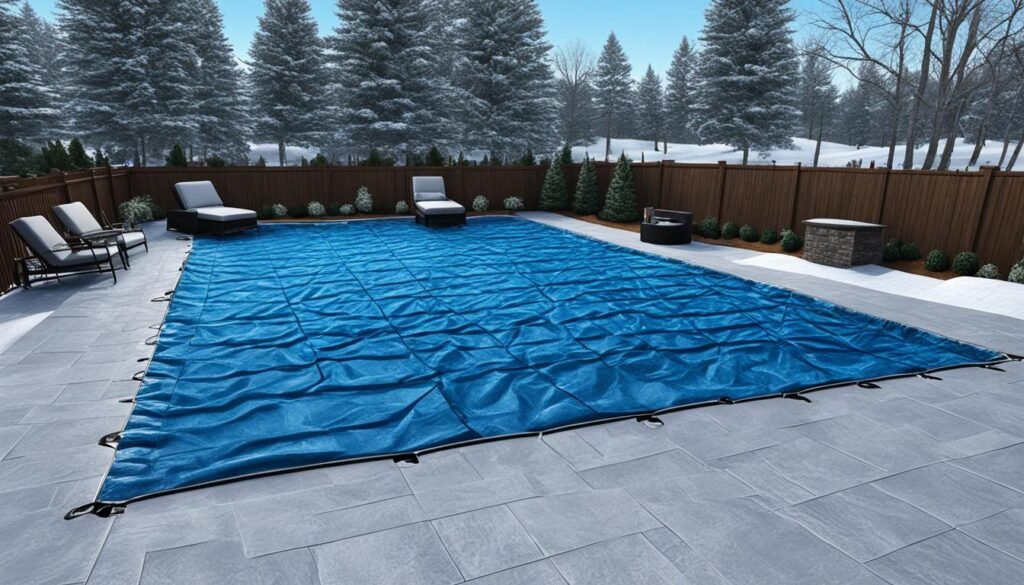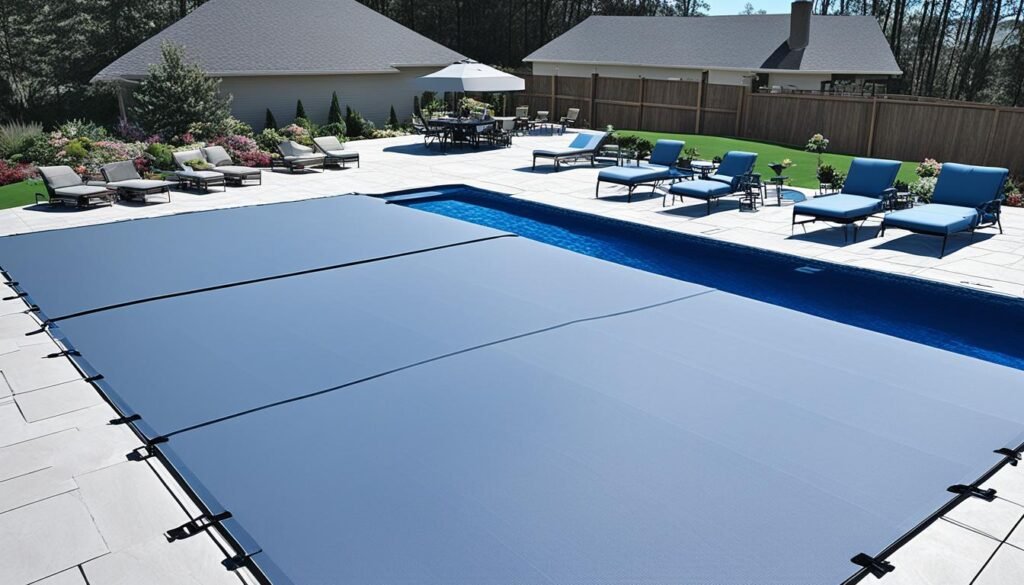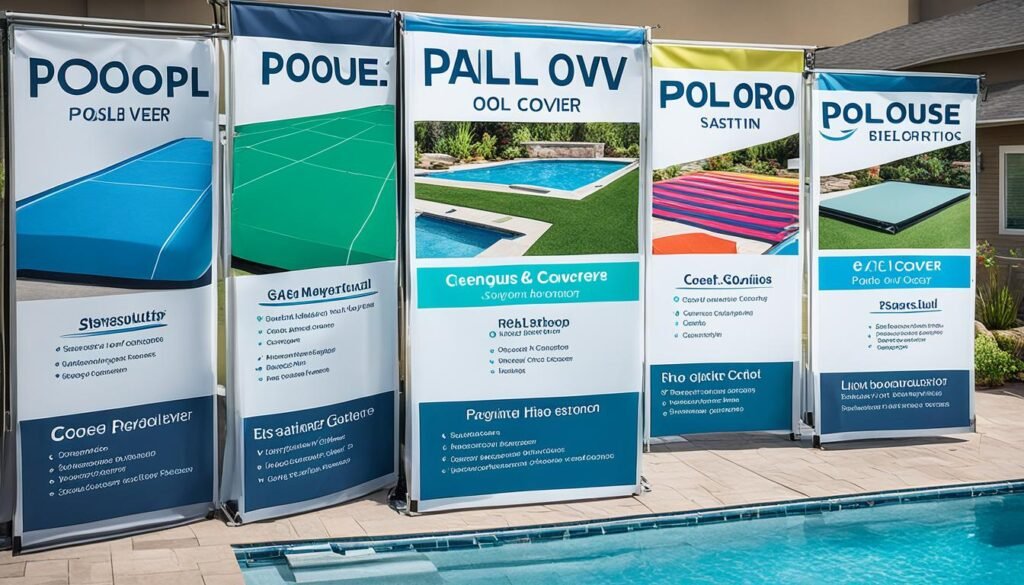Fall and winter seasons present pool owners with the annual challenge of keeping their swimming pools clean from the inevitable onslaught of soggy leaves and swirling debris. It’s a burden that, without the right equipment, can be both time-consuming and labor-intensive. The innovation of pool covers has revolutionized pool management, providing solutions that encapsulate convenience, efficiency, and safety. Among the top pool cover options, each brings its own set of advantages to the table, tailored to varying needs and preferences.
For those pondering which pool cover is best, the market offers a plethora of choices. Automatic pool covers stand out for their easy operation, often just a switch flip away, bringing the added benefits of safety, especially for homes with children or pets, and unmistakable long-term cost savings. The aspect of heat retention, along with reduced operational costs for filters, chemicals, and evaporation, make these covers a pragmatic choice.
On the other hand, the fortitude and reliability of mesh safety pool covers cannot be overstated. These fit any pool shape or design like a glove and offer dependable protection from debris, while also facilitating maintenance during the off-season. For an eco-friendly choice, solar pool covers absorb the sun’s warmth and present an environmentally conscious solution—but lack the more robust safety features of their counterparts.
Key Takeaways
- Discover the top pool cover options for maintaining a clean and safe pool environment.
- Learn about the cost-saving benefits and convenience of automatic pool covers.
- Understand the durability and safety provided by mesh safety pool covers.
- Explore how solar pool covers can contribute to eco-friendliness and cost-effectiveness.
- Delve into pool cover reviews to make an informed decision tailored to your pool’s needs.
- Utilize a thorough pool cover buying guide to aid in finding your ideal pool cover solution.
Understanding Different Types of Pool Covers
When it comes to safeguarding your swimming pool, it’s crucial to conduct a thorough pool cover comparison to identify the right type that offers not only protection and durability but also aligns with your budget and lifestyle requirements. Discovering how to choose a pool cover is essential for ensuring the cleanliness of your pool, maintaining water temperature, and providing safety for your family.
Automatic Pool Covers: Ease and Efficiency
Renowned for their convenience, automatic pool covers provide an incredibly efficient way to protect your pool. With the simple push of a button, these covers deploy to guard against debris, conserve water by reducing evaporation, and enhance the security around your pool — a critical factor for families with young children or pets. They represent a perfect combination of pool cover benefits with user-friendly operation and are available in a range of hiding options, adapting seamlessly to various pool designs.
Safety Mesh Pool Covers: Durable and Protective
The value of safety mesh pool covers lies in their strong, durable construction that can endure the weight of snow, water, or even people, offering peace of mind during off-season months. These covers are affordable pool covers that still provide ample protection and easy maintenance, thanks to their ability to let rainwater pass through without letting debris fall into the pool. Customization ensures a perfect fit regardless of pool shape or size.
Solar Pool Covers: Eco-Friendly and Cost-Effective
If minimizing your environmental footprint while cutting down on heating costs is a priority, solar pool covers are an enticing option. These eco-friendly covers, also known as bubble covers, amplify the pool’s temperature by capturing and retaining solar energy. Moreover, they can significantly reduce the amount of dirt that gets into the pool. Although they provide a multitude of pool cover benefits, they do require additional safety measures due to their limited weight-bearing capacity.
- Automatic pool covers maximize convenience and promote safety.
- Safety mesh pool covers are synonymous with robust protection.
- Solar pool covers offer an energy-efficient solution for pool heating.
Understanding the unique features and advantages of different pool covers is the first step to choosing the right one for your needs, contributing to a cleaner, safer, and more enjoyable swimming pool experience.
Evaluating Pool Cover Features for Safety and Maintenance
When the winter season approaches, choosing the best pool cover for winter becomes a top priority for pool owners. Key considerations revolve around not just retaining warmth and thwarting evaporation but also ensuring the safety of family and pets. Mesh pool covers are often lauded in pool cover reviews for their safety credentials, adept at keeping unwanted debris at bay and acting as a safeguard against accidental submersion.

Different climatic conditions can heavily influence the choice of a pool cover. Those residing in regions that experience severe winters may lean towards the robust protection offered by mesh covers. Conversely, in milder climates, the preference might tilt towards automatic covers, which are known to decrease water loss through evaporation effectively.
The installation process and the resulting ease of use are equally critical when selecting a pool cover. Above-ground pools may necessitate simple winches, while in-ground pools might require more elaborate, anchored systems for adequate tension and security. Pool cover buying guides emphasize the significance of a tailored fit, regardless of the pool’s type or shape, to maximize function and safety.
Another crucial aspect is the product warranty, an element that potentially speaks volumes about the cover’s durability and the manufacturer’s confidence in their product. Warranties of substantial length often indicate superior materials and build quality, making them a sound investment despite the higher upfront cost.
- Safety is paramount with pool covers designed to prevent accidental falls.
- Maintenance needs vary by climate—winter conditions demand sturdy, durable covers.
- Warranties reflect quality and can guide buyers to high-performing products.
In summary, the journey to finding the ideal pool cover involves a thorough assessment of safety features, endurance against the elements, and a maintenance routine that aligns with the owner’s lifestyle. With the right information and a detailed pool cover buying guide, navigating through the myriad options becomes a more streamlined and confident process.
Which pool cover is best?
When it comes to ensuring your swimming pool’s safety and maintaining pristine water quality, the choice of a pool cover is one of the most crucial decisions for a pool owner. Pool cover comparison is not just about picking a product; it’s about choosing a long-term solution for varying climates and seasons, especially considering the best pool cover for winter. Let’s explore the options and see how they stack up against one another in terms of safety features, usability, and suitability for different weather conditions.
Comparison: Safety Features and Usability
The debate over which pool cover is best essentially comes down to a balance between robust safety features and the ease of everyday use. Mesh pool covers, hailed for their durability, stand out in filtering debris and enabling water to drain, mitigating drowning risks and simplifying maintenance. However, they do necessitate professional installation. Solid pool covers provide an impermeable barrier that keeps out all types of contaminants and greatly reduces the chances of algae formation but may require a pump for water removal. The top pool cover options, like automatic covers, impress with their push-button convenience and superior safety profile, making them a favored choice for busy pool owners who prioritize time-saving and security.

Top Pool Cover Options for Variable Climates
Picking a pool cover for areas with fluctuating weather patterns can be challenging. A pool owner must consider a cover’s adaptability to different climatic conditions. Mesh covers allow for snow and rain to pass through, making them ideal for regions with heavy precipitation. However, solid and automatic pool covers might prove to be the better option in more temperate zones where retaining heat and preventing evaporation is paramount.
Best Pool Cover for Winter and Adverse Weather Conditions
When the temperature drops and the weather turns harsh, a top-notch pool cover becomes an indispensable asset. Pool covers designed for winter and adverse conditions need to provide not only protection from the elements but also ensure that the pool remains clean and safe. The mesh covers’ ability to tolerate substantial snow loads and the solid covers’ capacity to prevent waterlogging and contaminant ingress make them among the best pool cover options when preparing for winter.
| Cover Type | Safety | Usability | Climate Suitability | Maintenance |
|---|---|---|---|---|
| Mesh Pool Covers | High | Professional installation required | Excellent for all climates | Minimal; allows water drainage |
| Solid Pool Covers | High | May need pump for water removal | Best for temperate climates | Regular cleaning needed |
| Automatic Pool Covers | Highest | Push-button operation | Adaptable to most climates | Low effort; automated convenience |
Conclusion
Embarking on the journey of selecting the right pool cover encapsulates much more than a simple purchase—it is a pivotal step towards safeguarding your swimming experience. The crux of making an informed decision lies in understanding the pool cover benefits each type presents, whether that’s through enhanced safety with mesh covers, the energy efficiency of solar varieties, or the unmatched convenience of automatic systems. When pondering how to choose a pool cover, factors such as the local climate, pool’s structure, and your maintenance inclination must not be overlooked. Balancing these elements ensures your investment aligns with practical needs and personal preferences.
Finding the most suitable cover requires a focused approach, adhering to a pool cover buying guide that prioritizes the protection of your pool area, as well as the efficiency of maintenance routines. Each cover style brings forth unique advantages and understanding these can significantly streamline the selection process. An automatic pool cover may be well-suited for those craving ease-of-use, while a robust mesh cover offers peace of mind with its safety features, and a solar cover appeals to the eco-conscious, looking to harness the sun’s warmth.
In consultation with industry experts and a commitment to quality, investing in a high-caliber pool cover with a comprehensive warranty will pave the way for prolonged pool enjoyment. Remember, the goal is to unearth a solution that facilitates a serene swim season, year after year, while minimizing the hassle associated with pool upkeep. By tailoring your choice to your personal situation, you not only protect your pool but also augment the pleasure and convenience it brings to your home.
FAQ
Which pool cover is best for my needs?
The best pool cover for you depends on several factors, including your priority on safety, the climate in your area, the type of pool you have, and your maintenance preferences. Automatic pool covers offer convenience, while safety mesh pool covers provide durability and protection, and solar pool covers are eco-friendly and assist in heating the pool.
What are the benefits of an automatic pool cover?
Automatic pool covers provide ease of use with a switch-operated system that securely covers your pool, which can significantly improve safety, reduce heat loss, save on chemicals, and minimize water evaporation. They can be discreetly integrated into your pool area, seamlessly matching the pool’s design.
Can safety mesh pool covers help with pool maintenance?
Safety mesh pool covers are particularly beneficial for pool maintenance. They allow water to pass through while keeping out debris and can support a substantial weight, making them an excellent safety feature. Their durable material also stretches across the pool, providing a tight fit for enhanced protection.
Are solar pool covers a cost-effective option?
Solar pool covers can be considered cost-effective because they utilize solar energy to heat your pool, which can reduce heating costs. The bubble material captures the sun’s heat, and while they are less robust than other types of covers, they are helpful for reducing evaporation and dirt intake.
How do I choose the best pool cover for winter?
For winter, you’ll need a strong and durable cover that can withstand the more harsh weather conditions and possible heavy snowfall. Safety mesh pool covers or solid pool covers are typically recommended for winter use due to their resilience and ability to block out debris, potentially optimizing water chemistry and reducing algae growth.
What should I consider when looking at pool cover warranties and affordability?
Warranties for pool covers are a good indication of their expected longevity and quality. When considering affordability, weigh the initial cost against potential long-term savings like reduced chemical usage, filtration needs, and evaporation. Sometimes, investing more upfront can lead to greater cost savings over time.
How does climate influence the choice of a pool cover?
In colder climates with heavy snow, durable covers like solid vinyl or safety mesh are essential. They provide additional protection against the elements. In milder climates, you might favor a solar cover for its heat retention properties or an automatic cover for convenience and minimizing evaporation.
Are there pool covers suitable for every pool shape and size?
Yes, most types of pool covers can be custom-fitted to accommodate various shapes and sizes. Companies that produce safety mesh, automatic, and solar pool covers often offer tailor-made options to ensure the best fit for your specific pool design.
What are the main considerations for maintaining a pool cover?
Maintenance considerations for a pool cover include keeping it clean, checking for wear and tear periodically, ensuring that water does not accumulate on the surface, and, in the case of solid covers, ensuring the cover pump is functional. For mesh covers, regular adjustment of water chemistry may be necessary.

